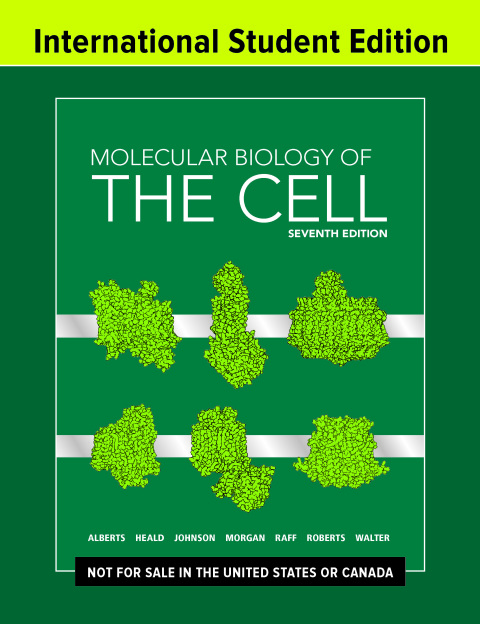Description
Efnisyfirlit
- Cover
- Half Title
- Publisher’s Notice
- Title Page
- Copyright
- Preface
- Note to the Reader
- Nomenclature for Genes and Proteins
- Resources for Instructors
- About the Authors
- Acknowledgments
- Brief Contents
- Special Features
- Contents
- Part I: Introduction to the Cell
- Chapter 1: Cells, Genomes, and the Diversity of Life
- The Universal Features of Life on Earth
- Genome Diversification and the Tree of Life
- Eukaryotes and the Origin of the Eukaryotic Cell
- Model Organisms
- Problems
- References
- Chapter 2: Cell Chemistry and Bioenergetics
- The Chemical Components of a Cell
- Catalysis and the Use of Energy By Cells
- How Cells Obtain Energy From Food
- Problems
- References
- Chapter 3: Proteins
- The Atomic Structure of Proteins
- Protein Function
- Problems
- References
- Part II: Basic Genetic Mechanisms
- Chapter 4: DNA, Chromosomes, and Genomes
- The Structure and Function of DNA
- Chromosomal DNA and its Packaging in the Chromatin Fiber
- The Effect of Chromatin Structure on DNA Function
- The Global Structure of Chromosomes
- How Genomes Evolve
- Problems
- References
- Chapter 5: DNA Replication, Repair, and Recombination
- The Maintenance of DNA Sequences
- DNA Replication Mechanisms
- The Initiation and Completion of DNA Replication in Chromosomes
- DNA Repair
- Homologous Recombination
- Transposition and Conservative Site-Specific Recombination
- Problems
- References
- Chapter 6: How Cells Read the Genome: From DNA to Protein
- From DNA to RNA
- From RNA to Protein
- The RNA World and the Origins of Life
- Problems
- References
- Chapter 7: Control of Gene Expression
- An Overview of Gene Control
- Control of Transcription by Sequence-Specific DNA-Binding Proteins
- Transcription Regulators Switch Genes on and Off
- Molecular Genetic Mechanisms That Create and Maintain Specialized Cell Types
- Mechanisms That Reinforce Cell Memory in Plants and Animals
- Post-Transcriptional Controls
- Regulation of Gene Expression by Noncoding Rnas
- Problems
- References
- Part III: Ways of Working With Cells
- Chapter 8: Analyzing Cells, Molecules, and Systems
- Isolating Cells and Growing Them in Culture
- Purifying Proteins
- Analyzing-Proteins
- Analyzing and Manipulating DNA
- Studying Gene Function and Expression
- Mathematical Analysis of Cell Function
- Problems
- References
- Chapter 9: Visualizing Cells and Their Molecules
- Looking at Cells and Molecules in the Light Microscope
- Looking at Cells and Molecules in the Electron Microscope
- Problems
- References
- Part IV: Internal Organization of the Cell
- Chapter 10: Membrane Structure
- The Lipid Bilayer
- Membrane Proteins
- Problems
- References
- Chapter 11: Small-Molecule Transport and Electrical Properties of Membranes
- Principles of Membrane Transport
- Transporters and Active Membrane Transport
- Channels and the Electrical Properties of Membranes
- Problems
- References
- Chapter 12: Intracellular Organization and Protein Sorting
- The Compartmentalization Of Cells
- The Endoplasmic Reticulum
- Peroxisomes
- The Transport of Proteins into Mitochondria and Chloroplasts
- The Transport of Molecules Between the Nucleus and the Cytosol
- Problems
- References
- Chapter 13: Intracellular Membrane Traffic
- Mechanisms of Membrane Transport and Compartment Identity
- Transport from the Endoplasmic Reticulum Through the Golgi Apparatus
- Transport From the Trans Golgi Network to the Cell Exterior and Endosomes
- Transport into the Cell from the Plasma Membrane: Endocytosis
- The Degradation and Recycling of Macromolecules in Lysosomes
- Problems
- References
- Chapter 14: Energy Conversion and Metabolic Compartmentation: Mitochondria and Chloroplasts
- The Mitochondrion
- The Proton Pumps of the Electron-Transport Chain
- ATP Production in Mitochondria
- Chloroplasts and Photosynthesis
- The Genetic Systems of Mitochondria and Chloroplasts
- Problems
- References
- Chapter 15: Cell Signaling
- Principles of Cell Signaling
- Signaling Through G-Protein-Coupled Receptors
- Signaling Through Enzyme-Coupled Receptors
- Alternative Signaling Routes in Gene Regulation
- Signaling in Plants
- Problems
- References
- Chapter 16: The Cytoskeleton
- Function and Dynamics of the Cytoskeleton
- Actin
- Myosin and Actin
- Microtubules
- Intermediate Filaments and Other Cytoskeletal Polymers
- Cell Polarity and Coordination of the Cytoskeleton
- Problems
- References
- Chapter 17: The Cell Cycle
- Overview of the Cell Cycle
- The Cell-Cycle Control System
- S Phase
- Mitosis
- Cytokinesis
- Meiosis
- Control of Cell Division and Cell Growth
- Problems
- References
- Chapter 18: Cell Death
- Problems
- References
- Part V: Cells in Their Social Context
- Chapter 19: Cell Junctions and the Extracellular Matrix
- Cell-Cell Junctions
- The Extracellular Matrix of Animals
- Cell-Matrix Junctions
- The Plant Cell Wall
- Problems
- References
- Chapter 20: Cancer
- Cancer as a Microevolutionary Process
- Cancer-Critical Genes: How They are Found and What They Do
- Cancer Prevention and Treatment: Present and Future
- Problems
- References
- Chapter 21: Development of Multicellular Organisms
- Overview of Development
- Mechanisms of Pattern Formation
- Developmental Timing
- Morphogenesis
- Growth
- Problems
- References
- Chapter 22: Stem Cells in Tissue Homeostasis and Regeneration
- Stem Cells and Tissue Homeostasis
- Control of Stem-Cell Fate and Self-Renewal
- Regeneration and Repair
- Cell Reprogramming and Pluripotent Stem Cells
- Problems
- References
- Chapter 23: Pathogens and Infection
- Introduction to Pathogens
- Cell Biology of Pathogen Infection
- The Human Microbiota
- Problems
- References
- Chapter 24: The Innate and Adaptive Immune Systems
- The Innate Immune System
- Overview of the Adaptive Immune System
- B Cells and Immunoglobulins
- T Cells and MHC Proteins
- Problems
- References
- Glossary
- Index
- About the Covers





